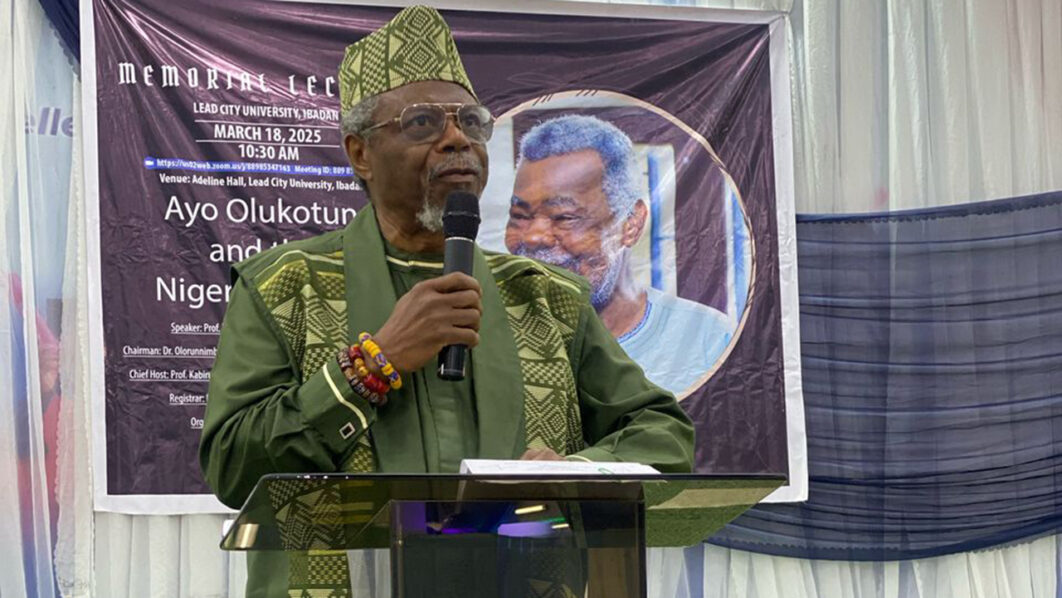
Eminent historian, Professor Toyin Falola, has attributed Nigeria’s deepening security crisis to a failing law enforcement system, which he described as “undermanned, underequipped, and obviously corrupt.”
He made this known while speaking at the Prof. Ayo Olukotun Memorial Lecture, held on Tuesday at Adeline Hall, Lead City University, Ibadan.
Falola warned that the country’s deteriorating policing system has allowed violent crime to escalate unchecked, leaving citizens vulnerable and eroding public trust in governance.
Falola, in his lecture titled Ayo Olukotun and the Nigerian Nation, lamented that Nigeria has been “overwhelmed by an upward cascade in violent crime, the surge in youth unemployment, delicate interethnic relations, ineffective public administration, and the palpable underdeveloped security architecture being overwhelmed by increasingly audacious criminal gangs brandishing sophisticated weapons.”
His critique did not spare government negligence and the fundamental flaws in the policing system, which, he argued, have turned law enforcement into a “theatre of inefficiency, corruption, and political manipulation.”
Falola painted a grim picture of Nigeria’s law enforcement agencies, which, despite being tasked with securing a nation of over 200 million people, remain plagued by chronic underfunding, operational inefficiency, and endemic corruption.
He criticised the misallocation of police personnel, noting that while security forces are readily available to protect corporate organisations, political leaders, and the wealthy elite, ordinary citizens are left vulnerable to unchecked criminality.
“The excessive deployment of security personnel to guard corporate organisations, political leaders, and the rich,” he stated, “has left ordinary citizens at the mercy of criminal gangs.”
Beyond manpower misallocation, the Nigerian police suffer from poor training, weak morale, logistical deficiencies, and outdated weaponry, all of which have rendered them ineffective in tackling the country’s growing security threats. The consequences of this failure are devastating: rampant kidnappings, armed robberies, violent insurgencies, and rural banditry continue to spread, further plunging the nation into a state of fear and uncertainty.
Prof. Falola further exposed how the chronic underfunding of the police force has led to systemic extortion and compromised law enforcement.
“The inadequacy of funding has pushed police stations into desperate measures, including soliciting financial support from the very communities they are meant to protect,” he remarked.
In many instances, police officers—unable to meet operational costs—have resorted to demanding bribes from citizens for basic law enforcement services, further deepening public distrust in the force.
More alarmingly, he revealed that some of the financial backing for local police units comes from wealthy individuals—some of whom are themselves complicit in criminal activity. This unholy alliance, he warned, creates a dangerous precedent where security agencies become beholden to private interests rather than the rule of law.
Reflecting on past attempts at police reform, Falola noted with dismay that successive administrations have failed to implement meaningful changes.
“Numerous suggestions have been offered on police reform, at different intervals, from the government of President Olusegun Obasanjo to Goodluck Jonathan,” he said. “Yet, none of the recommendations in these reports have ever been adopted or implemented.”
He dismissed the frequent salary increments for police officers as a superficial solution, arguing that while improved remuneration is important, it does little to address the systemic failures in law enforcement.
“The lack of substantial weaponry, supporting infrastructure, efficient skills, and an adequate police-to-citizen ratio are among the major challenges,” he stated. “These structural deficiencies must be tackled first, rather than merely increasing salaries.”
To break free from this cycle of insecurity and lawlessness, Prof. Falola called for a radical overhaul of Nigeria’s security architecture.
He advocated for a shift toward community-based policing models, which would decentralise law enforcement, empower local security networks, and bridge the gap between the police and the communities they serve.
“The goal of any such reform should be to come up with a capable and well-resourced police force that is citizen-friendly, decentralised vertically and horizontally, and is willing to emphasise intelligence, crime prevention, ‘beat’ specialization, and community policing,” he stated.
Without these fundamental changes, Falola warned that Nigeria’s security crisis will continue to spiral out of control, further eroding public trust in law enforcement and exposing citizens to heightened dangers.
The Prof. Ayo Olukotun Memorial Lecture, attended by key dignitaries including Dr. Olorunnimbe Mamora (Chairman), Prof. Kabiru Adeyemo (Chief Host), Dr. Dyebola Ayeni (Registrar), and Dr. Igho Fayomi (Organising Committee Chair), served as a stark reminder of the urgency of police reform.
“A nation that cannot secure its citizens is a failed state in waiting. The time for cosmetic changes is over; Nigeria must embark on genuine police reform or continue down the dangerous path of lawlessness,” Falola noted.






